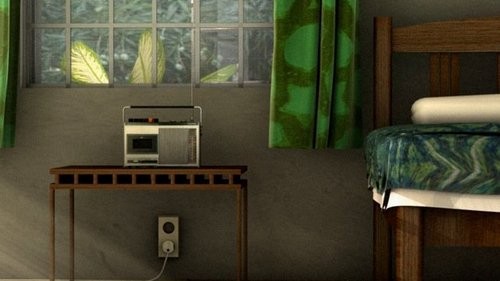Maja Weyermann
25 Sep - 20 Nov 2010
MAJA WEYERMANN
"Real-Time-Nomads"
Opening Friday, September 24, 2010, 7.p.m.
Duration September 25 – November 20, 2010
In her solo exhibition for uqbar, Maja Weyermann (* in Huttwil, Switzerland, lives and works in Berlin) presents for the first time her complex project Real–Time–Nomads that aims at revealing an unknown aspect of the cultural diversity of European big cities; to analyze - from the point of view of people with migrant backgrounds - the multi-dimensional spaces in which we move.
On show at uqbar will be prints of spaces Maja Weyermann reconstructed in 3-D. The images are recnotructed on the basis of interviews of the artist with shopkeepers and foodstand owners from different cultural backgrounds in Berlin in which they are asked about their memories of spaces from their childhoods in their countries of origin.
The medium of 3-D simulation allows for the creation of virtual space rooted in private memory. This process will make these realms, in which perception and imagination are merged, accessible to others. Thus, the possibilities of communication and the boundaries of intercultural understanding are explored in the act of (re)producing space.
In addition so called “city-walks" will be offered to the shops and small restaurants of the interview partners. Visitors can download the addresses of the shops and restaurants as well as the sound collages onto their mp3 players or mobile phones and listen to them as they wander from one location to the next. In the shops and restaurants the "video portrait" of the respective owner will be shown on TV screens. This video will be a montage of virtual tours through the remembered childhoodroom, quotes from the interviews and filmed material from the shop or restaurant.
Real-Time-Nomads is realiszed in cooperation with International Academy for Innovative Pedagogy, Psychology and Economics (INA) at Freie Universität Berlin, Office for Psychological Issues, uqbar, Collegium Hungaricum Berlin and THE KNOT and is supported by the European Cultural Foundation and LURI.watersystems.GmbH
"Real-Time-Nomads"
Opening Friday, September 24, 2010, 7.p.m.
Duration September 25 – November 20, 2010
In her solo exhibition for uqbar, Maja Weyermann (* in Huttwil, Switzerland, lives and works in Berlin) presents for the first time her complex project Real–Time–Nomads that aims at revealing an unknown aspect of the cultural diversity of European big cities; to analyze - from the point of view of people with migrant backgrounds - the multi-dimensional spaces in which we move.
On show at uqbar will be prints of spaces Maja Weyermann reconstructed in 3-D. The images are recnotructed on the basis of interviews of the artist with shopkeepers and foodstand owners from different cultural backgrounds in Berlin in which they are asked about their memories of spaces from their childhoods in their countries of origin.
The medium of 3-D simulation allows for the creation of virtual space rooted in private memory. This process will make these realms, in which perception and imagination are merged, accessible to others. Thus, the possibilities of communication and the boundaries of intercultural understanding are explored in the act of (re)producing space.
In addition so called “city-walks" will be offered to the shops and small restaurants of the interview partners. Visitors can download the addresses of the shops and restaurants as well as the sound collages onto their mp3 players or mobile phones and listen to them as they wander from one location to the next. In the shops and restaurants the "video portrait" of the respective owner will be shown on TV screens. This video will be a montage of virtual tours through the remembered childhoodroom, quotes from the interviews and filmed material from the shop or restaurant.
Real-Time-Nomads is realiszed in cooperation with International Academy for Innovative Pedagogy, Psychology and Economics (INA) at Freie Universität Berlin, Office for Psychological Issues, uqbar, Collegium Hungaricum Berlin and THE KNOT and is supported by the European Cultural Foundation and LURI.watersystems.GmbH

